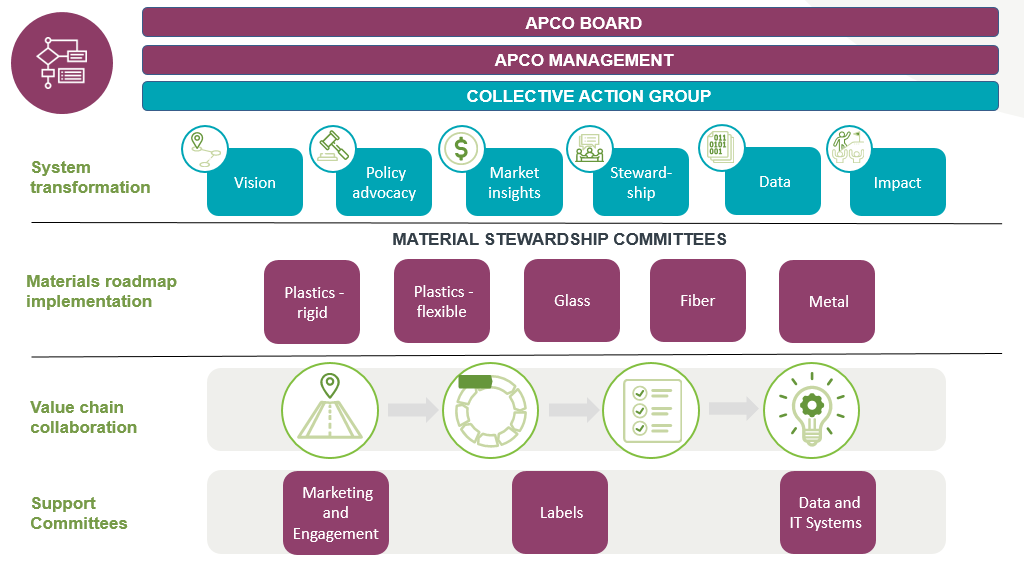Working Groups
APCO is committed to deep and meaningful consultation and collaboration with industry to meet the 2025 National Packaging Targets and to achieve a thriving circular economy for packaging by 2030. APCO’s committees play a crucial role in designing and overseeing the projects that will get us there.
Collective Action Group:
The Collective Action Group (CAG) is a team of leading industry representatives from across the supply chain and all levels of government who oversee the strategic delivery and the design of a systemic model for how Australia can transition to an advanced sustainable packaging ecosystem. The committee’s ongoing purpose is to play a convening and advisory role, working across the whole packaging value chain. It will identify, deliver and advocate for a system-level context that supports highest and best function and recovery for all packaging materials.
Material Stewardship Committees
Material Stewardship Committees (MSCs) validate the portfolio of actions that need to be taken to improve recoverability and end market demand for key packaging materials: flexible plastics, rigid plastics, fibre (paper, cardboard and wood), glass, metals, and labels. APCO’s Material Fact Sheets identified opportunities to reduce material losses and areas of improvement throughout packaging design, recovery, and recycled content for each material. The MSCs focuses on key initiatives and intervention needed by the government, the packaging sector, recyclers, and re-processors, and by APCO itself to achieve circularity in sustainable packaging.
Data and Systems Technical Advisory Committee (DAS-TAC)
The DAS-TAC Committee provides expert guidance to ensure that APCO identifies and prioritises opportunities and builds IT systems that serve the needs of its diverse stakeholder base. The group committee assists the in-house APCO team to sort, scope, and deliver new opportunities and data sets that can streamline processes, enhance supply chain integration, and create new knowledge products and insights for our collective benefit. The committee has oversight of the APCO Data and IT systems and may choose to opt-in to pilot or user test new features, capabilities, and knowledge products.
Marketing and Engagement Committee
This committee will provide expert guidance to ensure that APCO implements its consumer engagement strategies in a way that reflects the needs of its diverse stakeholder base. The group will assist the in-house APCO team to design and execute consumer education campaigns that increase consumer confidence and participation in a recycling, reuse, and recovery economy and to value packaging with high sustainability credentials. The committee will consist of industry representatives with marketing, brand, and communications experience.
Other Committees
APCO is actively involved in other working groups in specific topic areas. All working groups focus on reviewing, developing, and implementing priority initiatives to enable a successful transition to a circular economy for packaging.
- New Zealand ARL Advisory Committee (AAC)
The New Zealand ARL Advisory Committee (AAC) is supporting APCO in the delivery of the Australasian Recycling Label (ARL) Program in New Zealand. The objective of the AAC is to make recommendations to the Internal Review Committee to ensure that data and thresholds within PREP are accurate and provide technical advice on submissions to the ARL Program. The AAC also supports APCO in reviewing consumer education and communication activities and assets to ensure they are effective, consistent, and adhere to industry best practice.
Experts from across the New Zealand packaging supply chain, with representation from brand owners, packaging manufacturers, waste and recyclers, independent experts, and government, provide technical and marketing advice to the ARL Program.
- ANZPAC Collective Action Group (ACAG)
The ANZPAC Collective Action Group (ACAG) oversees the development and implementation of the ANZPAC Roadmap to meet the ANZPAC Regional Plastics Targets by 2025. The group is key in enabling a successful transition to a circular economy for plastic packaging across the ANZPAC region. The ACAG consists of eighteen Members, with six each from Australia, New Zealand, and the Pacific Islands. Representation spans the value chain for packaging and recycling, including packaging manufacturers, brand owners, retailers, recycling and waste management service providers, environmental groups/community groups, and governments.
- Container Deposit Scheme (CDS) National Working Group
The Container Deposit Scheme (CDS) National Working Group supports the national network of CDS Coordinators to drive accountability, transparency, and shared value for consumers, industry, and government through harmonisation of the various Schemes across Australia. This includes a comprehensive program that seeks to support the evolution in the way Australia sorts, recovers, and reuses beverage packaging containers.
